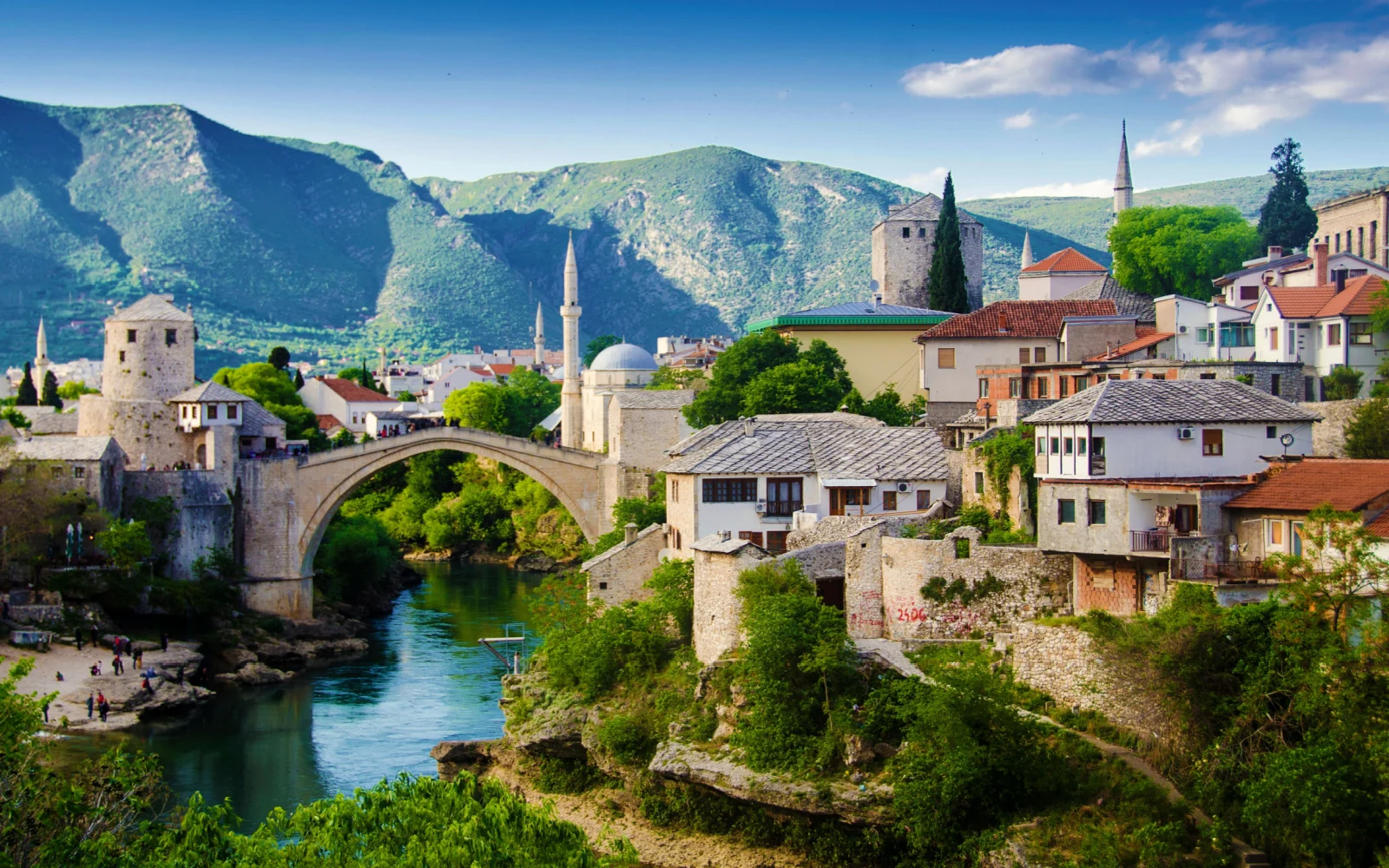The country of Bosnia and Herzegovina is a hidden gem in the heart of Europe. Nearly one million foreign tourists visited the country in 2022, showing that many travelers are wising up to Bosnia’s hidden charms.
Bosnia and Herzegovina was occupied by the Ottoman Empire for centuries and is one of Europe’s few Muslim countries, making it a place with a unique culture.
You can see traces of this multicultural legacy in the winding streets of Sarajevo’s Baščaršija or in the elegant arch of the famous bridge of Mostar. It also has beautiful nature for those looking to get off the beaten path, such as the serene waters of Blagaj or the roaring rivers of Una National Park.
But while it’s a gorgeous country that’s rich in history, is Bosnia safe to visit? Here’s our expert take.
Is Bosnia Safe to Visit in 2024?
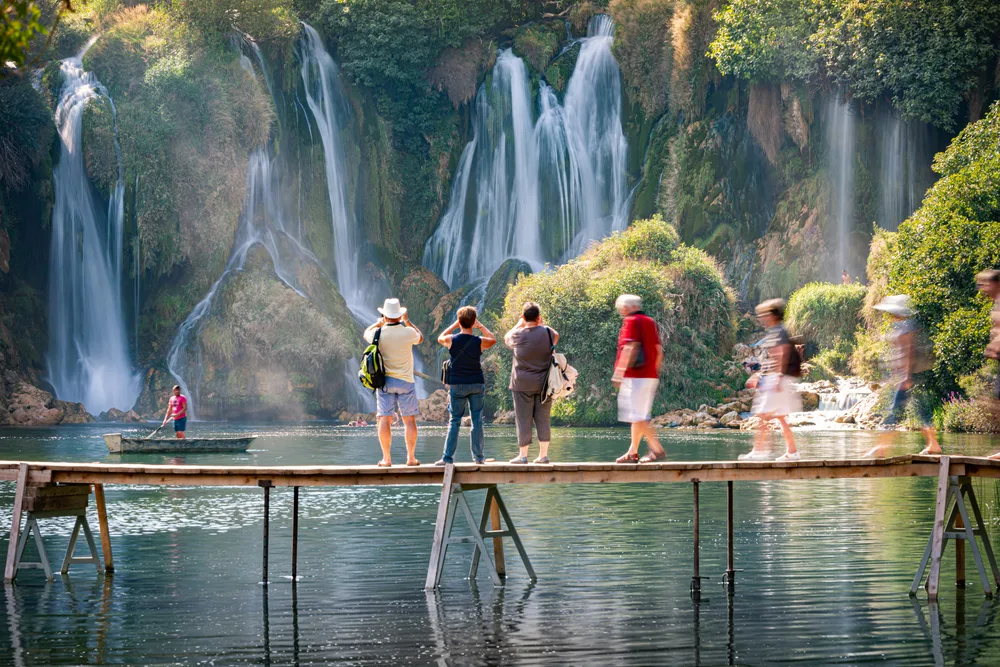
Konstantin Yolshin/Shutterstock
Yes. You can travel to Bosnia with full peace of mind because visiting this country is safe. However, the scars of war are still visible, so you will have to keep that in mind as you move around.
There is some crime, but it usually doesn’t affect tourists. The primary concern most visitors have when coming to Bosnia and Herzegovina is the war.
From 1992–1995, Bosnia was engulfed in a bloody war after it voted for independence from what remained of Yugoslavia. The capital city of Sarajevo was under siege for four years.
In many other towns, Bosnian Serb extremists killed and forcibly expelled Bosniak Muslims in a genocidal campaign of ethnic cleansing. Perhaps the most brutal incident was in Srebrenica, a UN safe haven that fell to the Bosnian Serb army, which then massacred over 8,000 men and boys.
The war may have ended almost 30 years ago, but its legacies are still very visible. It’s estimated that about 100,000 people were killed during the war, and millions were displaced.
The country is under a fragile peace and still very ethnically divided — it has two semi-autonomous entities divided by ethnicity and three presidents, one from each major ethnic group.
The war and ethnic divisions are still a sore subject for many, so don’t bring it up with your new Bosnian acquaintances unless they start the conversation first. The biggest legacy of the war that might concern visitors to Bosnia is the high prevalence of unexploded landmines.
According to statistics shared by the Irish government, an estimated 2% of Bosnia and Herzegovina’s territory is still covered with landmines and unexploded ordinances.
They are primarily located in rural areas, not big cities such as Sarajevo and Mostar. The mapped-out minefields are marked with red signs bearing a white skull and crossbones. However, there are many unlocated landmines, so never wander off of marked paths when exploring the Bosnian countryside.
The landmines are the primary reason most countries tell their citizens to exercise increased caution in Bosnia and Herzegovina. For example, the United States State Department put Bosnia under its Level Two travel advisory, citing landmines as well as the threat of terrorism.
Landmines are definitely a threat in Bosnia, but terrorism is not, although the United States and other foreign governments cite terrorism as a potential risk.
The risk is no greater here than in the rest of Europe and, in fact, might be lower — one of the most recent reported attacks was all the way back in 2015. The few attacks that have occurred were targeted firearm attacks on government officials and buildings, not directed at civilians.
Some of the fear of terrorism in Bosnia probably has to do with stereotypes about Muslim countries, but radical Islamic terrorism is barely present in the country. There is some crime in Bosnia, which other countries warn about in their travel advisories.
Common crimes include:
- Pickpocketing
- Scams
- Vehicle break-ins
- Burglaries
However, there are few violent crimes affecting tourists. The Bosnia of the present is a very safe place to visit.
Crime in Bosnia
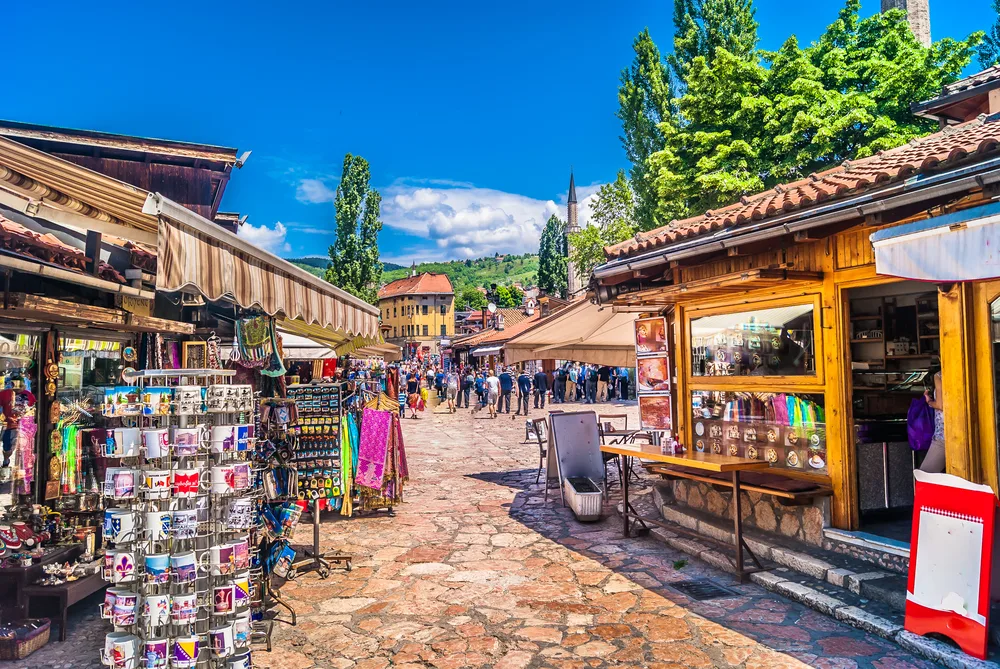
Dreamer4787/Shutterstock
The U.S. State Department may cite landmines and terrorism as the reason its citizens should exercise increased caution when in Bosnia and Herzegovina, but other countries mention crime.
For example, Canada tells its citizens to exercise a high degree of caution in Bosnia and Herzegovina due to high levels of crime. Those are important warnings, but how bad is crime in Bosnia really?
The violent crime rate in Bosnia and Herzegovina is actually fairly low. According to World Bank data, the intentional homicide rate as of 2020 was just 2.4 incidents per 100,000 people.
Other violent crimes are more common. For example, the assault rate was 27.4 cases per 100,000 people as of 2018. Most of these incidents occurred between people who knew each other and were not targeted at strangers.
Property crime is a much bigger concern for people in Bosnia and Herzegovina. As of 2020, the burglary rate was a whopping 142.6 incidents per 100,000 people. The rate of vehicle theft is also high, at 9.1 incidents per 100,000 people.
According to Numbeo, in a survey of people living in Bosnia and Herzegovina, the crimes they worried about most were vehicle thefts, vehicle break-ins, thefts, and drug abuse.
Bosnia and Herzegovina does, unfortunately, have a high rate of organized crime. According to the Global Organized Crime Index, it is the 5th worst country in Europe in terms of control of organized crime.
The fractured government and high levels of corruption allow criminal groups to flourish. Gangs in Bosnia are involved in many crimes, including human trafficking, smuggling of migrants, illegal arms trafficking, and drug trade to the rest of Europe.
While levels of organized criminality in Bosnia are high, most tourists generally don’t have a problem in the country. The only exception is if you decide to check out the nightlife.
Research which bars and clubs you go to ahead of time because there have been cases of shoot-outs at clubs owned or frequented by local mafia types that also affected innocent passers-by.
Although these incidents sound scary, remember that the vast majority of criminal incidents involving foreigners in Bosnia are petty crimes and that most people visit the country without any problems.
Pickpocketing
The crime you are most likely to encounter while out and about in Bosnia is pickpocketing. The UK government warns its citizens visiting Bosnia that pickpockets are common throughout the country.
This is especially true on public transportation or in major pedestrian areas in the cities of Sarajevo and Mostar. Whenever you are in a crowded area, it’s a good idea to take a few basic precautions to secure your valuables.
Make sure that your phone, wallet, and ID are secure in your front pocket or a zippered compartment of your bag, somewhere where it is not easily accessible to pickpockets. Try your best to blend in with the locals.
Don’t flash any valuables as that singles you out as a tourist — remember that many local Bosnians have to take out loans to get a smartphone, so your wallet or phone is certainly a tempting treat to potential thieves.
Scams are also common. Be especially careful in bars and clubs, as scammers sometimes take advantage of inebriated tourists to get a few bucks. Only change money at reputable money counters and withdraw cash from ATMs inside banks or post offices.
Bosnia’s street markets and street vendors are interesting, but be careful, as some like to overcharge tourists or pressure them into buying something. The city of Sarajevo has a lot of panhandlers, mostly elderly people.
While most are poor people trying to make ends meet in a country that has a very high elder poverty rate, some are accomplices of pickpockets who will work with them to distract you. They can also get very aggressive, so it’s best to ignore them, as difficult as it may be.
Vehicle Break-Ins
Vehicle break-ins are increasing in frequency, affecting both locals and visitors. They are most common around Sarajevo and popular sites near the capital, such as Trebević Mountain.
If you are just sticking to the cities, you won’t need a car since the city centers of Sarajevo and Mostar are compact and easily walkable. However, to explore more rural areas, you will probably need to rent a car.
Always take precautions to protect your rental car against break-ins, as thieves will target cars with rental stickers. Make sure all doors are locked and windows are rolled up, even if you are just leaving the car for a few minutes.
Don’t leave anything visible in the car, not even loose change. Finally, never under any circumstances leave your valuables unattended in the car.
Avoiding Bad Areas
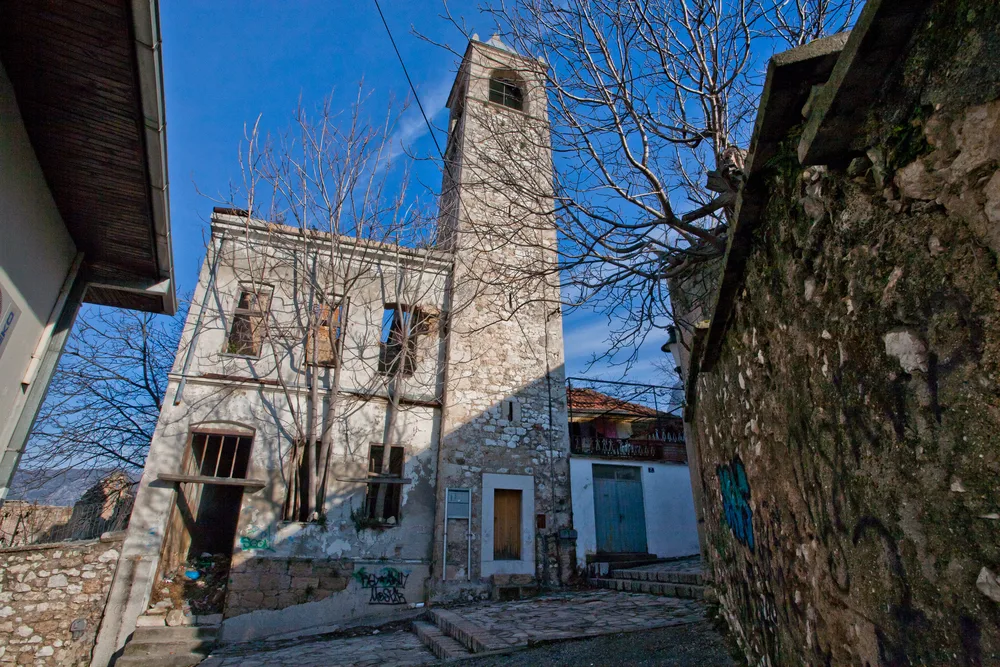
Radiokafka/Shutterstock
Avoid exploring rural areas and straying off paved paths without an experienced guide, as there are still a lot of unexploded landmines in Bosnia and Herzegovina.
Sarajevo has some areas that are a bit sketchy. Although you likely won’t be targeted for crime, there is a risk that you could get caught in the wrong place at the wrong time, especially at night.
Neighborhoods such as Grbavica, Skenderija, Alipašino Polje, Aneks, and Gornji Pofalići have a bit of a rough reputation, but they are far away from the center.
Things to Consider
Here are some other safety tips to make sure you have a good time in Bosnia and Herzegovina:
- Both pedestrians and drivers have a very loose relationship with the rules of the road, and outside of the major cities, the roads are usually in poor condition. Keep that in mind when you prepare to drive.
- Bosnia has a lot of stray dogs, especially in the cities and towns. Most are harmless, although they will beg for food persistently, but some have attacked people in the past.
- Bosnia is a multiethnic country, so be sensitive to different religions and cultures. Don’t assume that someone is of a certain ethnicity or ask prying questions. Know that customs in different parts of the country might be different — for example, areas that are predominantly Muslim don’t serve pork.
- The weather is fairly rough in Bosnia, with extremely hot summers and frigid winters. Pack your suitcase accordingly.
Frequently Asked Questions
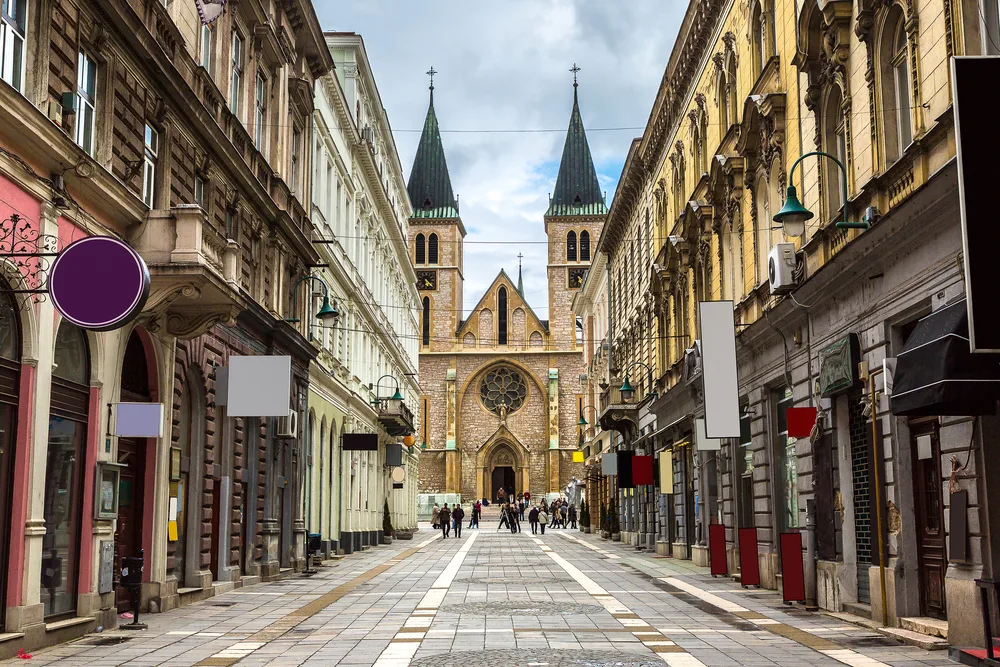
Sergii Figurnyi/Shutterstock
Here are some common questions fellow visitors to Bosnia wanted to ask:
Is Bosnia safe to travel to right now?
Yes, Bosnia and Herzegovina is safe to travel to right now! Although the legacies of the war are still visible, the fighting ended several decades ago, and now it is a friendly country waiting for tourists.
Are people friendly in Bosnia?
Yes, people are very friendly in Bosnia. Even in the rest of the Balkans, Bosnians have a reputation for being the friendliest people, and the country’s hospitality is legendary. It’s customary for tour guides and other people to go above and beyond to make visitors feel welcome.
Is it safe to go to Sarajevo?
Yes, it is safe to go to Sarajevo, the capital of Bosnia and Herzegovina. However, the petty crime rate is highest here compared to the rest of the country, so keep a firm grasp on your valuables.
Is Bosnia safe for solo female travelers?
Yes, Bosnia is very safe for solo female travelers. You might encounter some street harassment and stares, but generally, it is very safe. Just be careful if you decide to check out the nightlife, as there have been incidents of drink spiking.
What should you avoid in Bosnia?
Avoid dangerous extreme activities such as hiking the backcountry with no guide or exploring buildings damaged by the war, as you never know when you could get injured. Also, avoid asking prying questions about the war unless someone else brings it up.
So, Should You Travel to Bosnia?
Despite its tragic recent past, Bosnia is safe to visit today! If you stick to the cities, you don’t even have to worry about landmines — just watch your wallet. Happy travels!



